Online Distance Learning
-
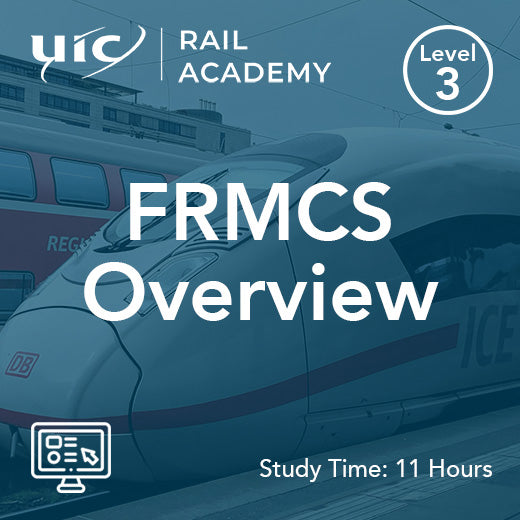
FRMCS V2 Overview (On-Demand)
This course is aimed at non-technical people or those in management roles that need an introduction to FRMCS. It outlines the need for FRMCS and introduces the standards that are required. The course also discusses the issues with the current radio spectrum allocations and how FRMCS and GSM-R may co-exist in the rollout phase. Also discussed the technology known as 5G that will be an integral part of FRMCS. Now fully updated to include FRMCS V2 specifications Part of UIC Rail Academy Course Contents FRMCS – An Introduction FRMCS Reference Architecture 5G Mission Critical Architecture and Procedures Radio Planning and Migration MCVideo Certified by Institution of Railway Signal Engineers (IRSE) The Institution of Railway Signal Engineers (IRSE) certifies that the syllabus for the FRMCS Overview course is appropriate for meeting the stated objectives of that course. For more information about the scope of the certification process provided by the IRSE please see the IRSE website www.irse.org. Also available as an instructor-led course, learn more
£1,218.00
-

Fundamentals of Telecommunications (On-Demand)
This course will cover a wide range of topics, starting with the basics of services and connectivity. It will provide insight into the evolution of telecommunication networks over time, reflecting on both historical advancements and future trends. We will begin with an introduction to the foundational aspects of telecom services and connectivity, setting the stage for more detailed explorations. We will then delve into fixed access technologies, starting with traditional copper pair connectivity and progressing through the evolutionary phases of fixed broadband access. This will include a thorough discussion of the technologies that have shaped and continue to influence fixed network landscapes. The mobile sector will receive a focused analysis beginning with the fundamental cellular concepts. We will explore the evolution of mobile broadband, especially under the frameworks established by the 3rd Generation Partnership Project (3GPP), covering technologies from GSM to advanced LTE and 5G networks. An essential component of this course will be a deep dive into operational support systems (OSS) and business support systems (BSS), which are critical for managing modern telecommunications services. We will examine the key platforms that support telecom services, such as billing, customer service, and network management systems. The course will also cover the burgeoning area of the Internet of Things (IoT), detailing how this technology integrates into existing telecom infrastructures and the new opportunities it creates. Additionally, we will consider the infrastructure backbone of the telecom industry, focusing on data centres and the relative costs associated with telecom infrastructure, excluding spectrum costs. Course Contents: Introduction Services and Connectivity - Evolution Fixed Access Mobile Access Support Systems Infrastructure
£95.00
-
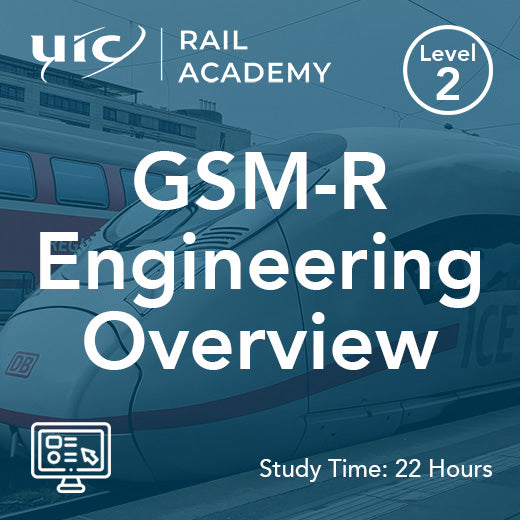
GSM-R Engineering Overview (On-Demand)
The GSM-R Engineering Overview Training Course is a comprehensive program designed for network engineers looking to deepen their understanding of GSM-R networks and operations. Part of the UIC Rail Academy, this course covers all principles of GSM-R networks and provides a detailed study of the services, features, and technology involved. Ideal for individuals in technical roles within the rail industry, this course offers a broad overview of GSM-R services and technology. Participants will gain insights into GSM and GSM-R networks, network architectures, identities, coverage, procedures, and the European Train Control System. A basic understanding of cellular radio networks and railway signaling is recommended as a prerequisite for this course. Who would benefit Those in or entering technical roles within the GSM-R industry who require a broad overview of the services, features and technology of GSM-R. Prerequisites A basic understanding of cellular radio networks and railway signalling, as well as the ability to comprehend technical subjects, would be useful. Topic Areas Include Introduction to GSM and GSM-R Networks GSM Network Architecture GPRS Network Architecture GSM-R Network Architecture GSM-R Services] GSM-R Identities GSM-R Coverage Network Access GSM-R Procedures European Train Control System Certified by Institution of Railway Signal Engineers (IRSE) The Institution of Railway Signal Engineers (IRSE) certifies that the syllabus for the GSM-R Engineering course is appropriate for meeting the stated objectives of that course. For more information about the scope of the certification process provided by the IRSE please see the IRSE website www.irse.org.
£1,820.00
-
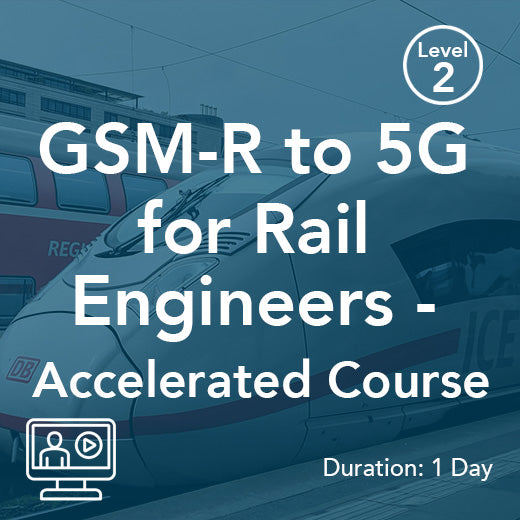
GSM-R to 5G for Rail Engineers – Accelerated Course
This accelerated one-day course provides rail engineers and technical professionals with a clear understanding of the transition from GSM-R to the Future Railway Mobile Communication System (FRMCS). It explores the fundamental differences in architecture, services, spectrum, and radio technology, highlighting how FRMCS leverages 5G capabilities to deliver enhanced performance, security, and flexibility. Through structured comparisons, participants gain the knowledge needed to appreciate the opportunities and challenges of modernising railway communications and supporting the shift towards the digital railway. Who Would Benefit This course is designed for railway engineers, telecom specialists, project managers, and technical administrators who need a clear overview of how FRMCS builds on and differs from GSM-R. It will be particularly valuable for those involved in planning, deploying, or supporting the next generation of railway communication systems, as well as stakeholders who need to understand the operational and technical impacts of the transition to 5G-based FRMCS. Prerequisites A background in GSM-R or GSM would be advantageous. Course Modules Railway Communications Network Architecture Addressing Radio Technology Radio Spectrum Security GSM-R vs FRMCS
£1,336.00
-
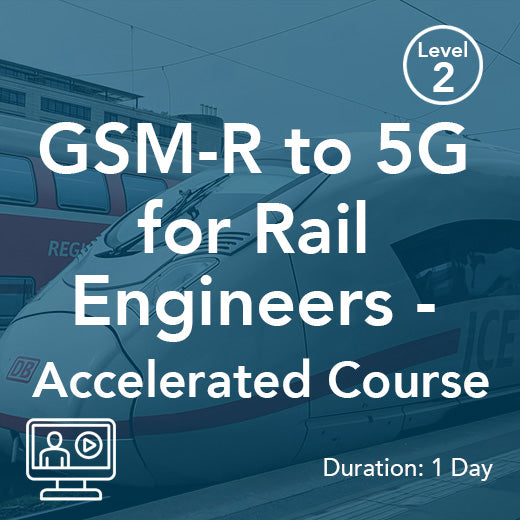
GSM-R to 5G for Rail Engineers – Accelerated Course (On-Demand)
This accelerated one-day course provides rail engineers and technical professionals with a clear understanding of the transition from GSM-R to the Future Railway Mobile Communication System (FRMCS). It explores the fundamental differences in architecture, services, spectrum, and radio technology, highlighting how FRMCS leverages 5G capabilities to deliver enhanced performance, security, and flexibility. Through structured comparisons, participants gain the knowledge needed to appreciate the opportunities and challenges of modernising railway communications and supporting the shift towards the digital railway. This self-paced on-demand distance learning course features illustrated course books, videos, tests and full tutor support. During the course you'll learn: The key technological differences between GSM-R and FRMCS. How network architectures, radio technologies, and addressing schemes compare. The changes in spectrum allocation and radio operation. How 5G technology introduces stronger security and new capabilities for critical railway applications. Who Would Benefit This course is designed for railway engineers, telecom specialists, project managers, and technical administrators who need a clear overview of how FRMCS builds on and differs from GSM-R. It will be particularly valuable for those involved in planning, deploying, or supporting the next generation of railway communication systems, as well as stakeholders who need to understand the operational and technical impacts of the transition to 5G-based FRMCS. Prerequisites A background in GSM-R or GSM would be advantageous. Course Modules Railway Communications Network Architecture Addressing Radio Technology Radio Spectrum Security GSM-R vs FRMCS
£1,336.00
-
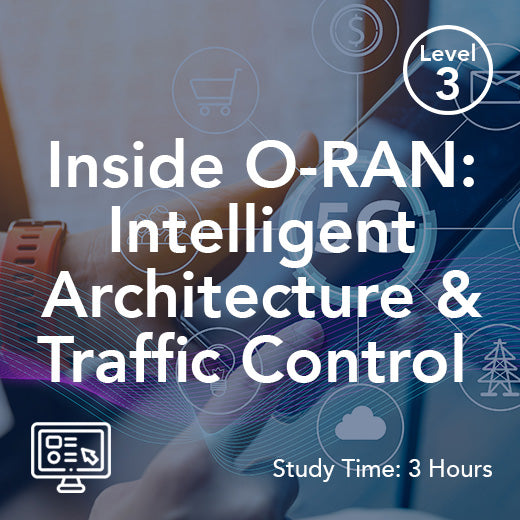
Inside O-RAN: Intelligent Architecture and Traffic Control (On-Demand)
5gThis short course is designed to provide a focused introduction to two key aspects of the Open Radio Access Network (O-RAN) framework: Module 1: O-RAN Architecture and Intelligent Control Explore the core components of the O-RAN architecture, including the disaggregated network functions, key interfaces, and the role of Artificial Intelligence and Machine Learning in enabling intelligent, automated network optimisation. Module 2: O-RAN Use Cases and Traffic Steering Learn how O-RAN supports more flexible and mobile-centric traffic steering strategies. The module explains the motivations behind operator-defined policies, the roles of the RICs, and includes a practical use case illustrating how traffic can be dynamically steered based on service requirements.
£95.00
-

Introduction to MEC (On-Demand)
Multi-access Edge Computing (MEC) is redefining how services are delivered by bringingcomputing power closer to the user - at the network edge. This approach reduces latency,improves efficiency, and enables new applications across industries. In this course, you’ll start by answering the question: What is MEC? You’ll explore itsconceptual foundations, the role of ETSI, and the drivers behind this shift, including costrealignment and the need for ultra-low latency. The course introduces enablingtechnologies such as cloud computing, virtualization, NFV/SDN, and 4G/5G, showing howthey combine to make MEC possible. Next, you’ll examine the MEC architecture, including service-based interfaces and highlevelrequirements for features and services. You’ll dive into real-world use cases, fromvideo analytics and location-based services to Industry 4.0, AR/VR, and V2X applications.The course also addresses challenges posed by MEC and how they are being overcome.Designed for professionals in telecoms, IT, and emerging technology fields, this courseprovides a clear, practical introduction to MEC - ideal for anyone seeking to understandhow edge computing enables next-generation services. Course Contents Introduction to MEC What is MEC Enabling Technologies for MEC MEC Overview MEC Architecture Requirements Use Cases Emerging Technologies
£95.00
-
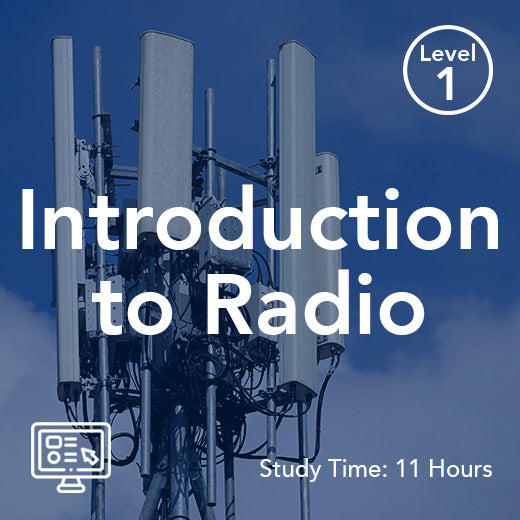
Introduction to Radio (On-Demand)
Expand your knowledge of radio technology with our Introduction to Radio Training Course. This short online self study course will provide you with a comprehensive understanding of how the radio spectrum is managed, the systems that utilize spectrum, and the technical aspects of radio system design. Whether you are a senior executive, manager, regulator, market analyst, or marketeer in the telecommunications industry, this course is designed to equip you with the knowledge and insights necessary to navigate the complexities of radio spectrum management. Our course covers a wide range of topic areas, including how radio spectrum is regulated, the concepts of bandwidth and channels, antenna characteristics, radio wave propagation mechanisms, and the impact of interference and noise. Additionally, you will gain an overview of various radio systems such as 2G, 3G, and 4G, and explore the factors driving the demand for spectrum. This course is tailored for individuals with no technical background, making it accessible to a diverse range of professionals seeking to enhance their understanding of radio technology. Join us for our Introduction to Radio Training Course and stay ahead of the curve in the ever-evolving world of radio technology. Gain valuable insights into the management and use of radio spectrum, align radio applications to frequency bands, and explore the latest advancements driving the demand for spectrum. Don't miss this opportunity to expand your knowledge and expertise in radio technology. This self-paced on-demand distance learning course features illustrated course books, videos, tests and full tutor support. Who would benefit Senior executives, managers, regulators, market analysts and marketeers involved in the telecommunications industry who require an understanding of the wide range of issues surrounding the use and management of radio spectrum. Prerequisites This course is designed for those with no technical background. Topic Areas Include How radio spectrum is managed and regulated How radio spectrum is used The concepts of bandwidth and channels An introduction to the characteristics of antennas Radio wave propagation mechanisms The impact of interference and noise Aligning radio applications to frequency bands Overview of radio systems – including 2G, 3G and 4G What is driving the demand for spectrum? Health and Safety issues
£500.00
-
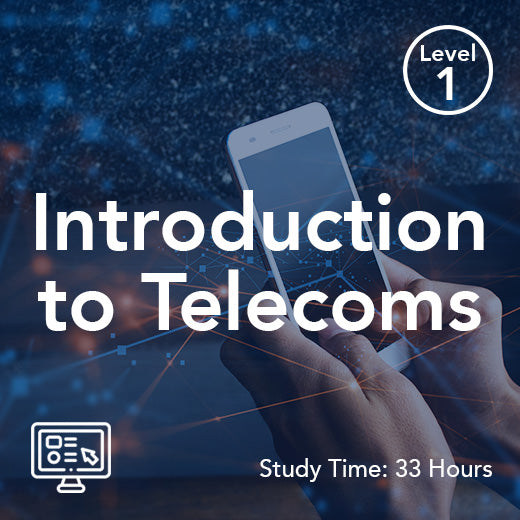
Introduction to Telecoms (On-Demand)
The Introduction to Telecoms Training Course is designed to provide participants with a comprehensive understanding of the core technologies used in fixed, mobile, and IP-based telecoms networks. Learners will delve into the fundamentals of networking technologies, including switching, transmission, and signalling, as well as the services that they support. The training also covers next-generation networking in an all-IP environment, ensuring that participants are equipped with the knowledge needed to excel in the telecommunications industry. Ideal for those currently working in or looking to enter the telecommunications field, this course is perfect for individuals who need a solid grasp of the functions and services offered by modern networks. Participants should have a basic mathematical ability and a technical aptitude, with the intention to pursue a technical role in the industry. By exploring topics such as telecoms evolution, network components and services, and mobile cellular systems, attendees will gain valuable insights into the ever-evolving world of telecommunications. This self-paced on-demand distance learning course features illustrated course books, videos, tests and full tutor support. Who would benefit Those working in or entering the telecommunications industry who need to understand the functions and services provided by modern networks. Prerequisites Mathematical ability and aptitude for technical subjects, with the intention to progress in a technical role. Topic Areas Include Telecoms evolution Network components and services The PSTN and ISDN: access and core networks Basic analogue and digital information concepts Time division multiplexing and switching techniques Transmission systems: PDH, SDH, WDM and OTN Mobile cellular systems: 2G, 2.5G, 3G and 3.5G Packet-switched techniques IP, Ethernet, the Internet, ISPs and Internet Services Fixed and Mobile Broadband access technologies Next Generation fixed and mobile networks IP Multimedia Subsystem Also available as a Live Online Training Programme, learn more.
£2,660.00
-
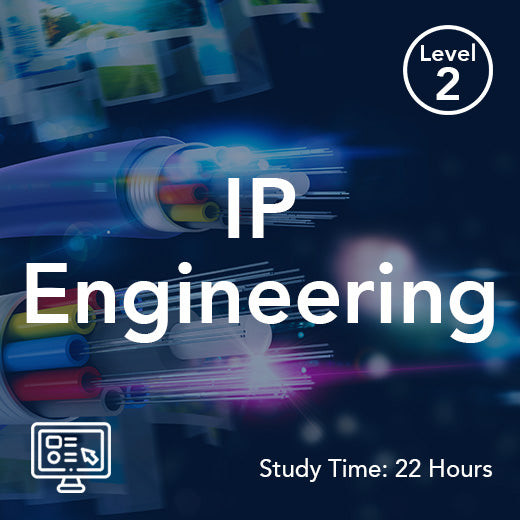
IP Engineering (On-Demand)
This comprehensive IP Engineering on Demand course provides a deep dive into Internet Protocol networks, covering engineering techniques, applications, protocols, and switching methods. Participants will gain the knowledge and skills needed to confidently navigate the IP environment, with topics including QoS, security, VPNs, and Multimedia over IP. Ideal for those looking to understand how IP networks are designed and implemented, this course is perfect for individuals seeking to enhance their expertise in this critical area. Participants in this course should have some prior knowledge or experience with packet-switched data network operation and Internet technology. The course covers a range of topic areas, including the background of the Internet and ISPs, the Data Link, IP, Transport, and Application layers, IPv6, DNS, MPLS, access services, routing in IP networks, OSPF, BGP4, IP QoS technologies, security engineering, IP VPNs, and IP multimedia services. By the end of the 22-hour course, participants will have a solid understanding of IP networks and the skills to work effectively in this dynamic environment. Who would benefit Those needing to understand how IP networks are designed and implemented. Prerequisites Some knowledge or experience of packet-switched data network operation and Internet technology is beneficial. Topic Areas Include: Background to the Internet and ISPs The Data Link, IP, Transport and Application layers IPv6 The Domain Name System (DNS) Introduction to MPLS Access services E-mail services and web hosting Name servers and heterogeneous networks Peering Routing in IP networks Overview of OSPF and BGP4 IP QoS technologies Security engineering IP VPNs IP multimedia services
£750.00
-
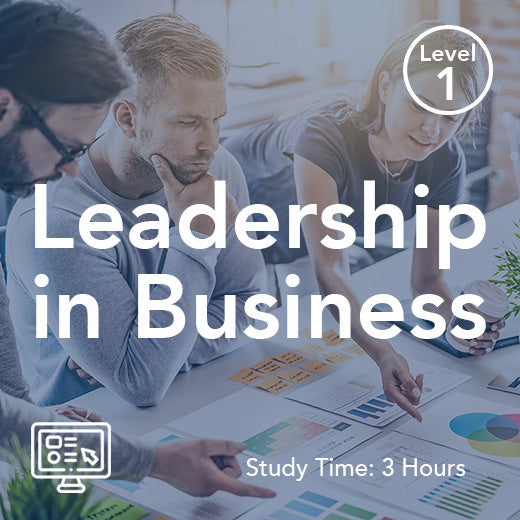
Leadership in Business (On-Demand)
Being an effective leader is difficult. Some in leadership positions struggle with the basics, others have huge gaps in their understanding, and many restrict themselves to management activities - actively avoiding actual leadership wherever possible. In most cases, the confidence to lead effectively is in short supply, and those that do have the confidence often confuse dominance, or power, with leadership. However, organisations who see good leadership and culture as THE key enablers for their people, are the ones most likely to thrive and prosper – in whatever field they are operating in. This comprehensive programme builds a solid understanding of leadership and culture in business, giving current and aspiring leaders the confidence and tools needed to better engage, guide, develop, coach, organise, assess, and most critically, empower their people, teams and departments. We develop a deep understanding of leadership, including all key aspects related to ourselves as an effective leader; understanding and engaging with our people; developing successful teams; and influence as a primary foundation. We follow this by an extensive look at how we can successfully support and deploy our people whilst building a balanced culture that maximises success, enables innovation, and drives engagement at every level. Exercises, discussions, break-outs, case studies and examples are used throughout in order to maximise learning, build confidence, and establish the foundations for successful leadership. Topics Covered Include Leadership in Business / Organisations Developing Effective Teams Influence and Communication Supporting and Deploying Effective People – Culture and Innovation
£95.00
-
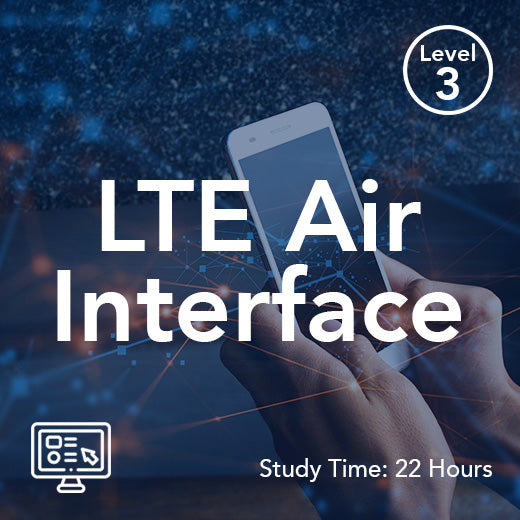
LTE Air Interface (On-Demand)
Our LTE Air Interface Training Course is designed to provide a comprehensive understanding of the air interface for LTE radio access. This course covers OFDMA principles, access and non-access stratum protocols, channel structures, connectivity and mobility management procedures, as well as radio link control functions. Engineers involved in equipment design, operation, optimization, or monitoring of the LTE radio link will benefit greatly from this training. Participants are expected to have an engineering background with some knowledge of digital radio systems and general radio principles and techniques. A basic understanding of LTE and experience with 2G or 3G systems would also be beneficial. Topics covered in the course include LTE system architecture, E-UTRAN architecture and interfaces, OFDMA/SC-FDMA basic principles, MIMO concepts and implementation, physical layer structures, access and non-access stratum protocols, and more. Enhance your knowledge and skills in LTE radio access and stay ahead in the rapidly evolving telecommunications industry. This self-paced on-demand distance learning course features illustrated course books, videos, tests and full tutor support. Who would benefit Engineers involved with equipment design, operation, optimization or monitoring of the LTE radio link. Prerequisites An engineering background with some knowledge of digital radio systems and general radio principles and techniques is assumed. A basic understanding of LTE and experience of 2G or 3G systems would be beneficial. Topic Areas Include LTE system architecture E-UTRAN architecture and interfaces OFDMA/SC-FDMA basic principles Defining orthogonality OFDMA features and benefits The Fourier transform OFDMA/SC-FDMA transmitter and receiver chains Modulation and coding, MIMO and the Cyclic Prefix MIMO concepts and implementation Physical layer structures Access and non-access stratum protocols Logical, Transport and Physical channels RRC, PDCP, MAC and RLC functions Resource allocation and scheduling strategies LTE-Advanced concepts Lower layer procedures Connection establishment Radio resource management procedures
£950.00
-
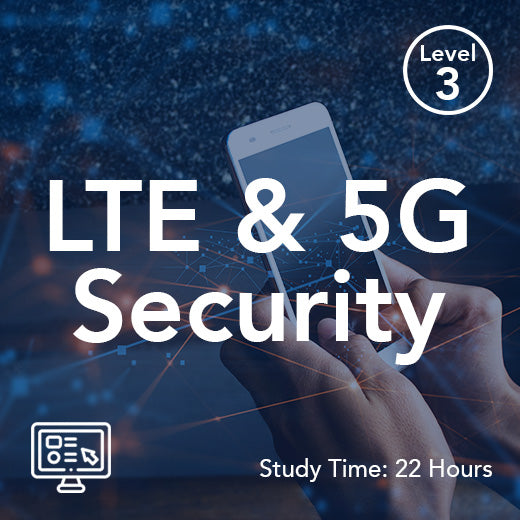
LTE and 5G Security (On-Demand)
LTE and 5G systems play a crucial role in our modern communication landscape, with the potential to revolutionize how we connect and interact with our devices. As these technologies become more prevalent, ensuring the security of our data and privacy becomes paramount. The LTE and 5G Security On-Demand Training Course offered by Wray Castle provides a comprehensive overview of the security measures implemented in LTE and 5G networks, covering key aspects such as authentication, key agreement, and network security protocols. This self-paced distance learning course delves into the intricacies of LTE and 5G security architectures, exploring the evolution from LTE to 5G and the security enhancements introduced in the latest generation of cellular networks. Participants will gain a deep understanding of the security procedures and key derivation methods used in both Non-standalone and Standalone Modes of 5G networks, as well as the authentication and interworking protocols involved in ensuring a secure communication environment. Designed for engineers, managers, and technical professionals working in the telecommunications industry, this course is also beneficial for individuals looking to broaden their knowledge of LTE and 5G security protocols. Whether you are new to the field or have prior experience in telecoms, this training course will equip you with the essential skills and insights needed to navigate the complex security challenges posed by LTE and 5G networks. This self-paced on-demand distance learning course features illustrated course books, videos, tests and full tutor support. Who would benefit This course is designed for engineers, managers and other personnel who have a need to acquire a technical overview of the security environment employed within LTE and 5G networks. It will also be of benefit to those in the wider technical community who have a need to understand the security protocols employed by cellular networks. Prerequisites Attendance on, or equivalent knowledge, LTE Engineering or 5G Engineering would be useful. Alternatively, experience working in this area of telecoms. Topic Areas Include LTE Security Architecture Authentication and Key Agreement Evolution to 5G 5G Non-Standalone Mode Security 5G Standalone Mode Security
£750.00
-
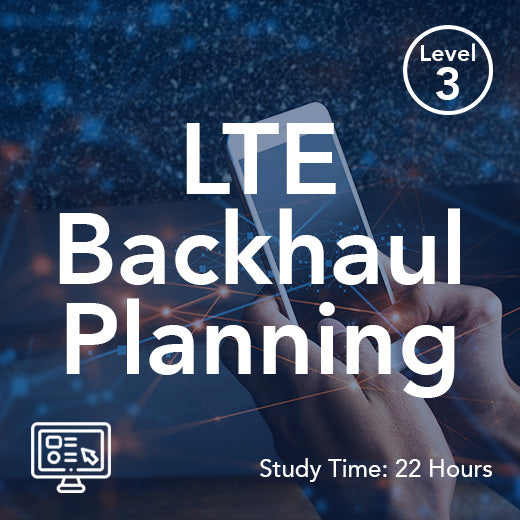
LTE Backhaul Planning (On-Demand)
This course provides a detailed overview of the issues related to the planning of backhaul services designed to support 4G LTE Cellular sites in both dedicated and single Radio Access Network (RAN) environments. The course focuses on planning techniques related to the most commonly-employed backhaul technologies used in conjunction with LTE, such as Ethernet, packet-based microwave and IP. It also covers aspects such as timing and security solutions and presents techniques that can be employed to estimate backhaul requirements and plan for suitable deployments. Join our LTE Backhaul Planning Training Course to gain a comprehensive understanding of the planning techniques and technologies essential for supporting 4G LTE Cellular sites. This course is designed for engineers working for network operators involved in the planning and implementation of RANs, specifically focusing on the backhaul region from the cell tower back to the core network. You will learn about backhaul technologies such as Ethernet, packet-based microwave, and IP, as well as timing and security solutions crucial for LTE deployments. Our 1-day course covers topics including backhaul overview, defining 4G backhaul requirements, transport network evolution, synchronization options, VLAN management, and more. By the end of the training, you will be equipped with the knowledge and skills to estimate backhaul requirements, plan suitable deployments, and ensure efficient backhaul solutions for 4G LTE networks. No specific prerequisites are required for this course, making it accessible to a wide range of professionals in the telecom industry. Sign up now to enhance your expertise in LTE backhaul planning and stay ahead in the rapidly evolving telecommunications sector. This course is delivered as a self-paced on-demand distance learning course and features illustrated course books, videos, tests and full tutor support. Who would benefit This course is designed for engineers working for network operators in the planning and implementation of RANs and in particular the backhaul region from the cell tower back to the core network and are looking at the options that exist to provide backhaul solutions suitable for 4G LTE networks. Prerequisites No specific prerequisites for this course although a good understanding of mobile networks and in particular the radio access part of 3GPP based networks. Topic Areas Include Backhaul overview Backhaul planning techniques Defining 4G backhaul requirements Backhaul technologies appropriate for 4G networks Transport network evolution Multi RAT and Multi Operator (MRMO) Synchronization options Cell throughput expectations Industry initiatives and forums Radio to transport QoS mapping VLAN management Backhaul traffic profile Backhaul QoS Planning exercise – cell throughput calculations On-Demand Online Training Our self-paced on-demand distance learning programmes are accessible on any computer, tablet or smartphone and allow you to study at a time and location that is convenient to you. Each course includes: Illustrated Course Books - featuring leading edge knowledge from subject matter experts. Videos - Detailed videos expand the points covered in the course books, discussing topics in greater depth. Tutor Support – Dedicated course tutors are available to answer any questions you might have throughout your studies. Formative Assessment - Modules include regular quizzes to support learning by testing your knowledge of the subject matter. Certification– Successfully complete the end of module tests to earn Digital Badges to demonstrate the depth of your knowledge of the topic. Included in Wray Castle Hub This course is also available as part of the Wray Castle Hub. An annual subscription delivers unlimited access to this course and over 500 hours of learning material consisting of 30+ Courses, 190+ Learning Modules, and 1,000+ Videos. Annual Subscription: £1400 (Most cost-effective option) Subscribe to Wray Castle Hub here
£500.00
-
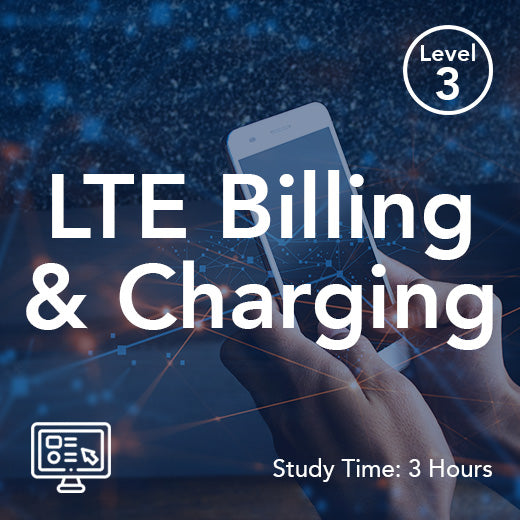
LTE Billing and Charging (On-Demand)
Our LTE Billing and Charging Training Course provides a comprehensive technical overview of the billing and charging architecture specifically designed for 4G LTE networks. Participants will gain insights into LTE bearer, traffic flow, and Quality of Service (QoS) concepts, as well as an in-depth understanding of the architecture of both online and offline billing systems. Key nodes, interfaces, and protocols used for transporting billing and charging information will be explored, along with the interactions with the billing system during basic LTE procedures. This course is ideal for engineers, designers, managers, and individuals involved in the development, deployment, or operation of LTE billing and charging systems. Familiarity with the LTE Evolved Packet Core is assumed, and experience with 2G or 3G billing systems would be beneficial. Topics covered include EPS bearer concepts, LTE QoS models, packet flows, deep packet inspection, policy and charging control, flow-based charging, billing architecture, charging data capture points, protocols (Diameter, CAP), interfaces (Gy, Gz, Rf, Ro), charging criteria, CDR formats, CDR generation, and charging interaction with basic LTE procedures. Join us for this informative and practical training session to enhance your knowledge and skills in LTE billing and charging. This self-paced on-demand distance learning course features illustrated course books, videos, tests and full tutor support. Who would benefit Engineers, designers, managers and others involved in the development, deployment or operation of LTE billing and charging systems. Prerequisites Familiarity with the LTE Evolved Packet Core is assumed. Experience of 2G or 3G billing systems would be beneficial. Topic Areas Include Review of EPS bearer concepts and LTE QoS models Packet flows, service data flows and traffic flow aggregates Deep packet inspection – heuristic algorithms and bearer-aware applications Outline of policy and charging control LTE billing and charging concepts Flow-based charging Billing architecture Online and offline charging systems Charging data capture points (S-GW, PDN-GW) IMS charging capture points Charging Data Function (CDF) Protocols – Diameter, CAP Interfaces – Gy, Gz, Rf, Ro and others Charging criteria – time-based, volume-based, application-based CDR formats CDR generation Charging interaction with basic LTE procedures
£95.00
-
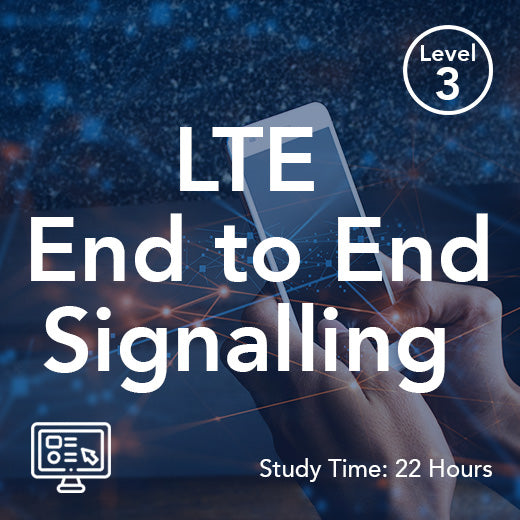
LTE End-to-End Signalling (On-Demand)
This course is designed to provide an end-to-end view of the whole set of signalling messages that support some of the most fundamental LTE network operations, such as: initial attach, PDN Connectivity, EPS Bearer setup, bearer resource allocation, handover and detach. Each procedure is presented in terms of the progression of signalling messages exchanged and each message is explored in detail. The course provides details of messages belonging to the following signalling protocols: RRC, NAS, S1AP, X2AP, GTPv2-C and also the Diameter S6a, S13 and Gx applications. Our LTE End-to-End Signalling Training Course (Course Code: LT1301) offers a comprehensive overview of the signalling messages involved in key LTE network operations. From initial attach to handover and detach procedures, participants will gain a deep understanding of the signalling protocols including RRC, NAS, S1AP, X2AP, GTPv2-C, and Diameter S6a, S13, and Gx applications. This course is ideal for engineers, managers, and personnel seeking a technical overview of the complete LTE signalling environment, providing valuable insights into the management of fundamental LTE procedures. Participants in this course will benefit from a detailed exploration of air interface signalling protocols, E-UTRAN signalling protocols, and EPC signalling protocols. Topics covered include initial attach procedures, idle mode procedures, connected mode procedures, handover procedures, and detach procedures. Prerequisites include a basic understanding of LTE network architecture, services, and protocols, which can be acquired through our LTE Engineering Overview and LTE Evolved Packet Core Network (LT3604) courses. An understanding of IP would also be beneficial for participants. Gain the knowledge and skills needed to navigate the complexities of LTE signalling protocols and procedure This self-paced on-demand distance learning course features illustrated course books, videos, tests and full tutor support. Who would benefit This course is designed for engineers, managers and other personnel who have a need to acquire a technical overview of the total LTE signalling environment (not just signalling in one part of the network) and also those that require an end-to-end view of the management of fundamental LTE procedures. Prerequisites A basic understanding of LTE network architecture, services and protocols, which can be gained from attending the LTE Engineering Overview (LT3600) and LTE Evolved Packet Core Network (LT3604) courses. An understanding of IP would be beneficial. Topic Areas Include Air interface signalling protocols E-UTRAN signalling protocols EPC signalling protocols Initial attach procedures Idle mode procedures S1 release Tracking area update procedure Service request procedure with ISR enabled Extended service request for CS fallback Connected mode procedures Connection establishment, modification and release Bearer resource allocation triggering dedicated EPS bearer establishment Bearer resource modification triggering EPS bearer modification PDN connectivity request Handover procedures X2-based handover with direct forwarding S1-based handover with S-GW change with indirect forwarding Inter-System PS handover to UMTS/HSPA without forwarding Detach procedures
£750.00
-
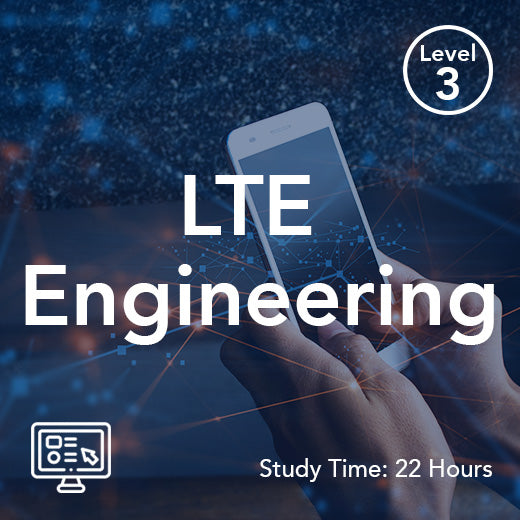
LTE Engineering (On-Demand)
A technical introduction and overview of LTE and LTE-Advanced, including the air interface, radio access network, core network and other key associated technologies. This self-paced on-demand distance learning course features illustrated course books, videos, tests and full tutor support. Who would benefit This course is intended for engineers either new to, or already working in, mobile communications. Prerequisites Familiarity with telecommunications and general engineering terminology is assumed and some understanding of 2G and 3G cellular systems would be beneficial. Topic Areas Include High level architecture of LTE Basic principles of OFDMA and SC-FDMA Air interface protocol stack Structure of the air interface physical layer E-UTRAN architecture, interfaces and protocols EPC architecture, interfaces and protocols LTE state diagrams Principles of bearers and Quality of Service (QoS) Voice options for LTE Power-on procedures UE procedures in idle and connected modes Enhancements in LTE-Advanced
£750.00
-
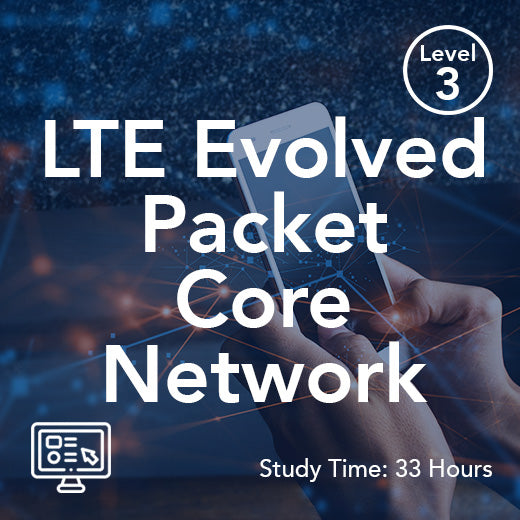
LTE Evolved Packet Core Network (On-Demand)
Our LTE Evolved Packet Core Network Training Course is designed to provide a comprehensive technical understanding of the Evolved Packet Core (EPC) for LTE systems. In this course, participants will learn about EPC architecture, interfaces, service provision concepts, application of IP technologies, overall protocol architectures, and optionally, a review of IMS functionality Engineers and other staff involved with switching or transmission architecture, optimization, network management, network testing, or monitoring of the EPC would greatly benefit from this training. Participants are expected to have an engineering background with some knowledge of core network technologies, including IP. Experience with 2G or 3G systems would also be beneficial for a better understanding of the course material. The course covers a wide range of topic areas, including the high-level architecture of LTE, functions of key EPC components like MME, S-GW, PDN-GW, HSS, and PCRF, LTE state diagrams, inter-operation with 2G, 3G, and non-3GPP networks, voice options for LTE, principles of bearers and Quality of Service (QoS), data transport in the EPC, policy and charging control architecture, IETF and 3GPP protocols in the EPC, power-on procedures, UE procedures in idle and connected modes, enhancements in LTE-Advanced, and optionally, an overview of the functions and architecture of the IMS. This self-paced on-demand distance learning course features illustrated course books, videos, tests and full tutor support. Who would benefit Engineers and other staff involved with switching or transmission architecture, optimization, network management, network testing or monitoring of the EPC. Prerequisites An engineering background with some knowledge of core network technologies, including IP, is assumed. Experience of 2G or 3G systems would be beneficial. Topic Areas Include High level architecture of LTE Functions of the MME, S-GW, PDN-GW, HSS and PCRF LTE state diagrams Inter-operation with 2G, 3G and non-3GPP networks Voice options for LTE Principles of bearers and Quality of Service (QoS) Data transport in the EPC Policy and charging control architecture IETF protocols in the EPC, including SCTP, DiffServ and Diameter 3GPP protocols in the EPC, including GTP and S1-AP Power-on procedures UE procedures in idle and connected modes Enhancements in LTE-Advance
£950.00
-
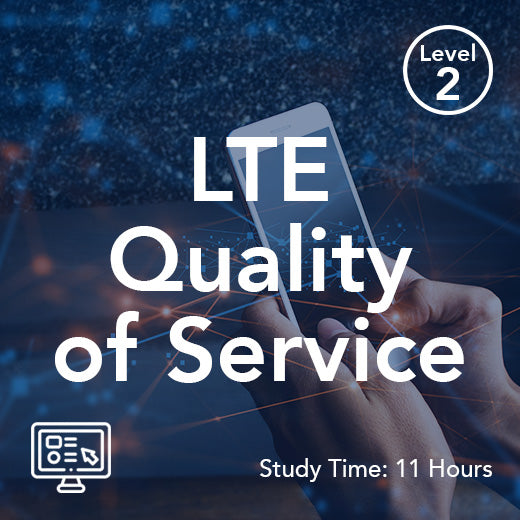
LTE Quality of Service (On-Demand)
Our LTE Quality of Service training course is designed to provide a comprehensive understanding of the key concepts and principles behind Quality of Service (QoS) in LTE networks. This course delves into the End-to-End EPS Bearer and the underlying Transport Network Layer (TNL) where QoS is crucially applied. Participants will explore the main QoS concepts and learn about the interworking between LTE QoS and other network types such as UMTS, GPRS, and IMS.This course is ideal for engineering and technical management professionals who need a technical overview of the technologies and techniques utilized by 4G LTE networks to define and control the QoS for user connections. Participants are expected to have an engineering background with some knowledge of telecommunications technologies and protocols. Previous LTE training and familiarity with QoS mechanisms in legacy 2G and 3G networks would be beneficial.By enrolling in this course, you will gain insights into topics such as E-UTRAN architecture and interfaces, EPS Bearer and PDN Connectivity options, LTE QoS parameters, QCI, ARP, QoS Management, LTE PCC mechanisms, TNL concepts, DiffServ, MPLS, Ethernet QoS, and much more. Enhance your knowledge and skills in LTE QoS with our expert-led training course. This self-paced on-demand distance learning course features illustrated course books, videos, tests and full tutor support. Who would benefit This course is suitable for engineering and technical management staff who require a technical overview of the technologies and techniques employed by 4G LTE networks to define and control the QoS applied to user connections. Prerequisites An engineering background with some knowledge of telecommunications technologies and protocols is assumed and previous LTE training would be beneficial, as would knowledge of QoS mechanisms in legacy 2G and 3G networks. Topic Areas Include E-UTRAN architecture and interfaces EPS Bearer and PDN Connectivity options and operations User plane connection concepts, packet flows, SDFs and Traffic Flow Aggregates LTE QoS parameters, QCI, ARP QoS parameter representation in LTE signalling protocols QoS Management – TFTs and packet filters LTE PCC (Policy and Charging Control) mechanisms PCC Rules, function and structure Interaction between PCC elements and internal and external network nodes Mapping LTE QoS to legacy network schemes Measuring QoS TNL concepts, architecture and QoS mechanisms DiffServ, MPLS and Ethernet QoS End-to-End QoS Architecture and Operation Network node QoS functions QoS influence on LTE handovers
£500.00
-
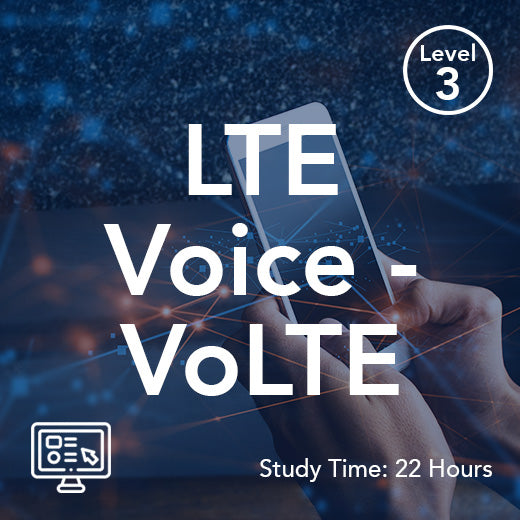
LTE Voice - VoLTE (On-Demand)
Our LTE Voice (VoLTE) training course is designed to provide a comprehensive technical understanding of how VoIP services are delivered using LTE and the IP Multimedia Subsystem. This course is ideal for engineering and technical management professionals looking to gain in-depth knowledge of the options available in LTE for delivering voice and real-time traffic through VoIP. Topics covered in this course include a technical overview of LTE, introduction to LTE voice options, IP Multimedia Subsystem (IMS) overview, Voice over LTE (VoLTE) system architecture, VoLTE protocols, services, and codecs, VoLTE call setup procedures, SRVCC, SMS delivery over IMS, VoLTE emergency calls, and Voice over Wi-Fi. This self-paced on-demand distance learning course features illustrated course books, videos, tests and full tutor support. Who would benefit This course is suitable for engineering and technical management staff who require a technical description of the options that exist in LTE for delivering voice and other real-time traffic types by means of VoIP. Prerequisites Attendance on this course assumes previous attendance on the LTE Engineering Overview course (LT3600) or equivalent basic LTE knowledge (although a recap of basic LTE architecture and concepts is provided at the start of the course) and also assumes a working knowledge of IP. Topic Areas Include Technical overview of LTE Introduction to the options for LTE voice Technical overview of the IP Multimedia Subsystem (IMS) System architecture for Voice over LTE (VoLTE) VoLTE protocols, services and codecs VoLTE power-on and registration procedures VoLTE call setup procedures Access domain selection Single Radio Voice Call Continuity (SRVCC) Delivery of SMS messages over the IMS VoLTE emergency calls Voice over Wi-Fi
£750.00
-

Machine Type Communications for LTE (On-Demand)
Mobile communication systems were originally designed to support voice (with SMS), but then focused primarily on developing data connectivity. With broadband connectivity representing the major areas of opportunity, networks were standardised, deployed and optimised to fully support that [fairly narrow] set of use cases. More recently, machine to machine communication, the Internet of Things (IoT) and connected innovation have seen massive growth, and become a much bigger part of the communications industry. However, the data connectivity requirements are very different to that of broadband. In order to optimally support this type of data, a number of modifications, new features, and complimentary technologies have been introduced to the networks. In LTE, these are grouped under the term Machine Type Communications (MTC). This course explores the technical aspects of MTC for LTE, and includes an examination of NB-IoT (Narrowband IoT) as a complimentary technology. Initially, the course provides an overview of IoT and low power networking / connectivity systems, and highlights the role and requirements of LTE for MTC. We then look at the features and performance of the different categories of MTC UE (User Equipment), the Air Interface modifications and features, and the Cellular IoT (C-IoT) enhancements to the Evolved Packet Core (EPC). Course Modules Introduction to LTE and the Internet of Things (IoT) LTE Technologies for the IoT NB-IoT and IoT Core Network Enhancements
£95.00
-
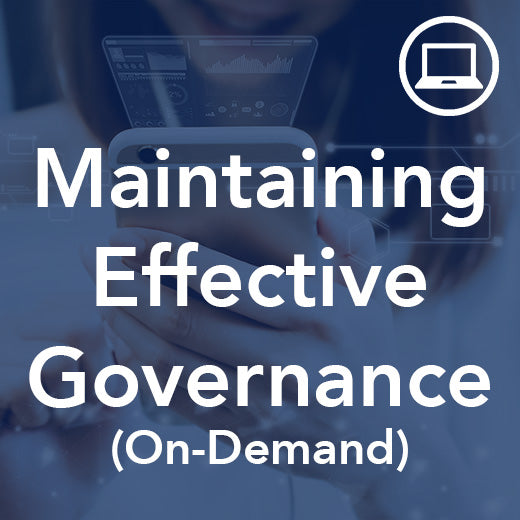
Maintaining Effective Governance (On-Demand)
Course Code LB06 Course Summary The business world is ever-changing, with focus shifting constantly as industries develop and evolve. Increasing requirement for good governance, however, has been a constant focus over a number of decades now. Companies that embrace good governance as part of their core value-system are invariably in a much better position as they scale, or as they expand /evolve their operating footprint to embrace new sectors or geographies. At its most effective, good governance, is felt throughout the organisation – with shareholders, employees and customers all more likely to engage in a positive and engaging way as the organisation develops. At its worst, bad governance directly contributes to dangerous working conditions or environmental disaster – and very likely, costly lawsuits, and competitive disadvantage. This short module is designed to complement our other business programmes by exploring key aspects of governance and what it all means for businesses. Comprehensive discussions and examples are used to illustrate the wide and varied topics covered, the critical focus areas within each topic, and how progressive governance can be used to positively impact, not only the business, but wider society. Prerequisites None Topics Covered include: Health and Safety Data Protection Ethical Financial Reporting Employment Practices Charity / Social Engagement Environment and Sustainability Aligning with the UN Sustainable Development Goals Consequential Thinking – The Four-Way Test Sustainability – Example Approached On-Demand Online Training Our self-paced on-demand distance learning programmes are accessible on any computer, tablet or smartphone and allow you to study at a time and location that is convenient to you. Each course includes: Illustrated Course Books - featuring leading edge knowledge from subject matter experts. Videos - Detailed videos expand the points covered in the course books, discussing topics in greater depth. Tutor Support – Dedicated course tutors are available to answer any questions you might have throughout your studies. Formative Assessment - Modules include regular quizzes to support learning by testing your knowledge of the subject matter. Certification– Successfully complete the end of module tests to earn Digital Badges to demonstrate the depth of your knowledge of the topic.
£95.00
-

MEC APIs and Service Integration (On-Demand)
Multi-access Edge Computing (MEC) relies on robust APIs and standards to enableseamless integration of applications and services at the network edge. Understanding these interfaces is key to unlocking MEC’s full potential in 5G and beyond. In this course, you’ll start with an overview of MEC standards and the ETSI standardizationprogramme, including the latest developments and principles behind API design. You’llexplore core APIs such as Radio Network Information, Location Services, UE Identity,Bandwidth Management, and Multi-Traffic Steering, as well as APIs for WLAN, fixedaccess, V2X, and IoT. The course also covers application management interfaces,including lifecycle management, package management, and application descriptors (AppD). Next, you’ll dive into advanced topics such as MEC federation, support for slicing, securityand regulatory considerations, and best practices for QoS measurement. You’ll learn howMEC integrates with 5G networks, including traffic steering, local access to the 5G datanetwork, and mapping MEC APIs to CAPIF. Real-world examples, proofs of concept, anddeployment trials illustrate how MEC APIs enable interoperability and innovation acrossdiverse ecosystems. Designed for professionals in telecoms, IT, and edge computing, this course provides aclear, practical introduction to MEC APIs and service integration - ideal for anyone seekingto understand how standards and interfaces drive next-generation edge services. Course Contents API Principles Core Service APIs Advanced Service APIs Management APIs Additional Standardization Topics – Part 1 Additional Standardization Topics – Part 2 5G integration issues – Part 1 5G Integration issues – Part 2 5G Integration MEC Ecosystem
£95.00
-
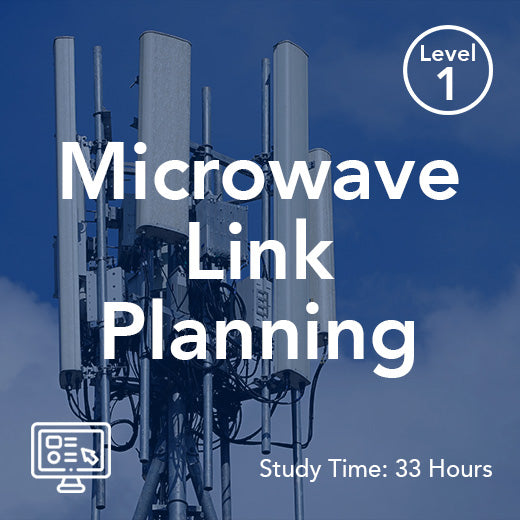
Microwave Link Planning (On-Demand)
The course covers all of the essential aspects of planning point-to-point microwave link systems, from conception to commissioning. Who would benefit Those involved in the specification, planning and maintenance of fixed microwave radio transmission, backhaul and access links. Prerequisites A good knowledge of radio principles, or a background in telecommunications engineering, or attendance on the Radio Principles course (RP1301). Topic Areas Include ITU-R and CEPT recommendations ETSI standards Spectrum management and channel plans Frequency assignment Digital radio performance characteristics Noise and interference in radio systems Reliability, availability and performance objectives Microwave antennas and feeders Radiation Pattern Envelopes (RPEs) Refraction, k-factor, reflection and diffraction Path profiling and Fresnel zone clearance Power budgets Rain and Multipath/Dispersive fade margins Dimensioning space and frequency diversity Interference management Practical link planning exercises Practical exercises, including design of a fixed link transmission network. On-Demand Online Training Our self-paced on-demand distance learning programmes are accessible on any computer, tablet or smartphone and allow you to study at a time and location that is convenient to you. Each course includes: Illustrated Course Books - featuring leading edge knowledge from subject matter experts. Videos - Detailed videos expand the points covered in the course books, discussing topics in greater depth. Tutor Support – Dedicated course tutors are available to answer any questions you might have throughout your studies. Formative Assessment - Modules include regular quizzes to support learning by testing your knowledge of the subject matter. Certification– Successfully complete the end of module tests to earn Digital Badges to demonstrate the depth of your knowledge of the topic. Also available as a Live Online Training, Learn more
£2,660.00
-

NFV Architecture and Infrastructure (On-Demand)
Network Functions Virtualisation (NFV) is transforming how modern networks are built, managed, and scaled. By decoupling network functions from proprietary hardware and running them on virtualised environments, NFV enables flexibility, efficiency, and innovation across telecom and IT ecosystems. In this course, you’ll explore the NFV functional architecture and the NFV Infrastructure (NFVI) that underpins it. Starting with the NFV framework and its core principles, you’ll learn how virtualised network functions (VNFs) are composed, scaled, and interconnected. The course introduces key concepts such as VNF descriptors, forwarding graphs, and reference points, giving you a clear view of how NFV systems communicate and operate. You’ll also dive into the NFVI layer, examining its components - compute, storage, and networking, and how technologies like hypervisors, cloud computing, and virtualisation enable NFV deployments. Topics include performance optimisation, security aspects, and advanced techniques such as CPU pinning, micro-segmentation, and VXLAN overlays. By the end, you’ll understand how NFV and MANO (Management and Orchestration) work together to deliver agile, scalable network services. Designed for professionals in telecoms, IT, and network engineering, this course provides a practical, jargon-free introduction to NFV architecture and infrastructure - ideal for anyone looking to understand the foundations of virtualised networking without diving into vendor-specific details. Course Contents NFV Functional Architecture NFV Framework and VNFs Virtual Links and Forwarding Graphs Reference Points and Infrastructure Options NFV Infrastructure (NFVI) NFVI Architecture NFVI and Virtualization Hypervisor Domain Containerisation Compute and Infrastructure Network Domains NFVI Implementation
£95.00
-

NFV Use Cases (On-Demand)
Network Functions Virtualisation (NFV) isn’t just a concept, it’s a practical solution shapingthe future of telecom and IT services. This course explores real-world NFV applications,showing how virtualisation delivers flexibility, scalability, and cost-efficiency across diversenetwork environments. In this course, we’ll look at NFV use cases, diving into specific scenarios, including: NFVI as a Service (NFVIaaS) and how it operates across multiple domains Virtual Network Function as a Service (VNFaaS) and Virtual Network Platform as aService (VNPaaS), plus a comparison of the two VNF Forwarding Graphs (VNF FGs) and their role in service chaining Virtualisation of mobile core networks, IMS, base stations, and home environments Advanced deployments such as virtual CDNs (vCDN) and fixed access NFV You’ll also explore ETSI Proof of Concept (PoC) projects, including demonstrations ofvirtual EPC applications, SDN-controlled forwarding graphs, and resilience techniques. These examples show how NFV is implemented in real networks and the benefits it bringsto operators and service providers. Designed for professionals in telecoms, IT, and network engineering, this course provides apractical, jargon-free look at NFV in action. Ideal for anyone who wants to understand howvirtualisation is applied to real-world network challenges.
£95.00
-

O-RAN in 5G (On-Demand)
As 5G networks become more open, intelligent, and disaggregated, understanding the Open Radio Access Network (O-RAN) is essential for professionals working in mobile network design, deployment, and optimisation. This short, single-module course provides a concise yet comprehensive introduction to O-RAN and its critical role in modern 5G networks. In just three hours, you’ll explore the key architectural and functional components that make O-RAN unique. The course begins with an overview of 3GPP architectural options and how they lay the foundation for NG-RAN deployments. You’ll then examine the principles of RAN functionality and protocols before diving into the detailed architecture of NG-RAN and O-RAN. You’ll gain a solid understanding of functional split options—crucial for enabling multi-vendor interoperability—as well as the differences between traditional and open RAN deployments. The course explains the high-level and logical architectures of O-RAN, including the roles of the Central Unit (CU), Distributed Unit (DU), and Radio Unit (RU), and how open interfaces and intelligent controllers reshape how networks are managed.Additional topics include the application of Artificial Intelligence and Machine Learning in O-RAN, the concept of the O-RAN white box, and critical considerations around fronthaul, backhaul, and interfaces like CPRI and eCPRI. Designed for technical professionals looking for a clear and accessible introduction to O-RAN, this course equips you with the essential knowledge needed to understand the future of radio access networks. Course Contents 3GPP RAN Architecture for 5G 3GPP Architectural Options RAN Functionality and Protocols NG-RAN Architecture Split Options O-RAN, O-RAN Operations and Maintenance High Level O-RAN Architecture Logical Architecture of O-RAN Artificial Intelligence and Machine Learning O-RAN White Box Backhaul CPRI and eCPRI
£95.00 £47.50
-

Optimising Operations & Transformation (On-Demand)
Organisations tend to have a great deal of momentum – the bigger the organisation, the more difficult it can be to change, pivot and reposition. Even smaller business units can be very difficult to transform. Most successful businesses are in a constant state of flux, and they embrace change in order to optimise and pivot accordingly. Whether it is slow evolution, or larger initiatives that require fundamental reorganisation and refocusing of resources and people, the best businesses are able to drive those changes, embrace the new opportunities and maintain their agility and flexibility. This programme explores change within businesses / organisations – whether it is a case of optimising operations, or full-on transformation, we hit the key barriers and enablers for change, before exploring the change process and the role of the leader and key stakeholders. People issues are given a particular focus – in terms of individual and team factors, and the critical role that culture plays in the change process (and in the ongoing organisation). Exercises, case-studies, discussions and break-outs are used to reinforce learning, and to build confidence that participants need to effect positive change in the workplace – whatever size of organisation they work in. Topic Covered Include Key Principles – Optimising Operations and Transformation The Issue of Company Momentum Momentum – the Impact of Corporate Culture and DNA Momentum – Impact of Corporate Attitude to Risk Momentum and Risk – the Results Resistance to Change – Illustrated Understanding the Nature of Change Change – a Non-Stop Journey Evolving to Stay Relevant and Optimised
£95.00
-

Radio Frequency, Bandwidth and Spectrum - an Introduction (On-Demand)
Radio frequency and spectrum are at the heart of modern communications, enablingeverything from mobile networks to broadcasting and satellite services. Understanding how frequency, bandwidth, and spectrum work is essential for anyone involved in telecoms, networking, or wireless technologies. In this course, you’ll start with the fundamentals of frequency and bandwidth, exploringconcepts such as sine waves, time and frequency domains, and the differences betweenanalogue and digital signals. You’ll learn how signal quality is measured, how analogue-to digital conversion works, and why bandwidth matters for services ranging from humanspeech to commercial applications. Next, you’ll dive into the radio spectrum, examining how frequencies are allocated andmanaged globally and nationally. The course introduces key organisations and frameworks, including ITU-R, CEPT, ECO, and Ofcom, and explains how spectrum licensing and exemptions operate within the UK. You’ll also gain insight into the role of World RadioConferences (WRC) in shaping international spectrum policy. Designed for professionals in telecoms, broadcasting, and wireless technologies, thiscourse provides a clear, practical introduction to frequency, bandwidth, and spectrum - ideal for anyone seeking to understand the foundations of radio communication without getting lost in technical complexity. Course Contents Frequency and Bandwidth Radio Spectrum
£95.00
-

Radio Network Surveys (On-Demand)
To carry out meaningful radio surveys of GSM, UMTS, LTE and Wi-Fi networks demands a knowledge of how those networks operate and the key radio metrics. These are discussed in detail along with the types of surveys and information they can reveal. The course is focused on the practical issues of performing surveys backed up with demonstrations. The equipment and software used on this course includes the Rohde & Schwarz TSMA radio scanner, ROMES and NESTOR software as well as the QualiPoc, handheld survey tool. Our Radio Network Surveys Training Course is designed to provide participants with the knowledge and practical skills needed to conduct meaningful surveys of GSM, UMTS, LTE, and Wi-Fi networks. This course covers key radio metrics, types of surveys, and the equipment and software used in conducting surveys, including the Rohde & Schwarz TSMA radio scanner, ROMES and NESTOR software, and the QualiPoc handheld survey tool. Whether you are involved in coverage optimization, crime scene investigation, alibi verification, intelligence gathering, or performance analysis, this course will help you create a comprehensive picture of the cellular radio network environment. Participants will learn about cellular radio principles, spectrum and identities, radio measurements and metrics, cell selection and reselections for GSM, UMTS, and LTE, location reporting in idle mode, mobility in Wi-Fi, connected mode activity for mobile devices, tools for radio surveys, spectrum occupancy, coverage surveys, base station position estimation, and practical guidance for surveying. While previous attendance on GSM, UMTS, LTE, and Wi-Fi courses may be advantageous, it is not essential to benefit from this training. Who would benefit Those that need to create a ‘picture’ of the cellular radio network environment to aid coverage optimization, crime scene investigation, alibi verification, intelligence gathering and performance analysis. This course features the Rohde & Schwarz TSMA radio scanner in conjunction with the ROMES and NESTOR software as well as a drive test tool. Prerequisites Previous attendance on GSM, UMTS, LTE and Wi-Fi courses would be advantageous but not essential. Topic Areas Include: Cellular radio principles Cellular radio spectrum and identities Wi-Fi radio spectrum and identities Radio measurements and metrics Cell selection and reselections for GSM, UMTS and LTE Location reporting in idle mode Mobility in Wi-Fi Connected mode activity for mobile devices Tools for radio surveys Spectrum occupancy Coverage surveys Base station position estimation Practical guidance for surveying
£1,815.00
-
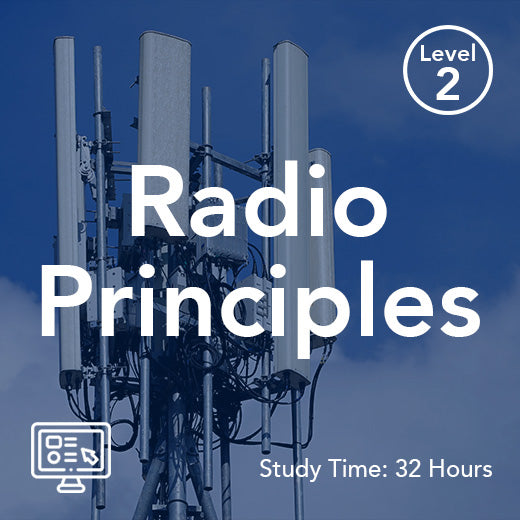
Radio Principles (On-Demand)
The world has seen a phenomenal growth in the application and use of radio technology. What haven’t changed, however, are the principles upon which all of these technologies are built.The Radio Principles course provides an in-depth understanding of these principles on which radio technologies are built, taking students on a logical and detailed path through the various aspects of the theory, and practice, of radio communications. Through attendance on this course, delegates will build an understanding of how radio works and how this impacts manufacturers, users and operators of radio technology. Who would benefit Those requiring an understanding of the principles and concepts of radio that underpin today’s radio technologies. Prerequisites Some experience in telecommunications engineering is beneficial but the course is also suitable for delegates with an aptitude for technical subjects. Topic Areas Include The use and management of the radio spectrum Waveform fundamentals and baseband information Power levels and measurementsAnalogue and digital modulation techniques Simplex, semi-duplex and duplex - FDD and TDD Multiplexing – FDMA, TDMA, CDMA and OFDMA Transmitters and receivers Antennas and transmission lines Radio propagation mechanisms Introduction to coverage prediction Principles of cellular coverage techniques Diversity and MIMO An overview of fixed and mobile radio technologies in use today
£2,660.00
-

Radio Propagation, Interference and Coverage - an Introduction (On-Demand)
Radio signals don’t just travel in straight lines - they interact with the environment incomplex ways. Understanding how propagation works, and what affects coverage andinterference, is essential for anyone involved in wireless communications, broadcasting, ornetwork planning. In this single-module course, you’ll start with the fundamentals of radio propagation,exploring how signals behave across different frequency bands - from VLF and LF throughHF, VHF, and beyond. You’ll learn about the role of the ionosphere, how conditions varybetween day and night, and how space waves enable long-distance communication.Next, you’ll examine radio coverage, including key factors such as reflection, scattering,diffraction, and attenuation. The course explains how terrain, clutter, and atmosphericanomalies impact signal reach, and why coverage planning is critical for reliable service. Finally, you’ll dive into radio interference, covering issues like co-channel and adjacentchannel interference, illegal operation, and frequency planning. You’ll also explore howweather conditions and noise affect performance, and what strategies help mitigate thesechallenges. Designed for professionals in telecoms, broadcasting, and wireless technologies, thiscourse provides a clear, practical introduction to radio propagation, coverage, andinterference - ideal for anyone seeking to understand the principles behind reliable radiocommunication. Course Contents Propagation Radio Coverage Radio Interference
£95.00
-

Radio Surveys: Practical Tool Use - an Introduction (On-Demand)
Accurate radio surveys are essential for planning, optimizing, and troubleshooting wirelessnetworks. This course introduces the tools and techniques used in real-world surveyscenarios, helping you understand how measurements are captured and analysed forreliable coverage. In this course, you’ll start with practical demonstrations of survey tools, including drivesurvey systems, R&S ROMES drive test software, and R&S TSMA radio scanners. You’lllearn how measurements are recorded outdoors and indoors, and explore advancedfeatures such as automatic cell detection (ACD), cellular coverage surveys, and basestation analysis. The course also covers cell position estimation, handover analysis, andWi-Fi coverage surveys, giving you a comprehensive view of survey applications. Next, you’ll gain guidance for conducting radio network surveys, including best practices forpersonal safety, spot/location surveys, route profiling, and indoor coverage assessments.You’ll learn how to choose between idle mode and connected mode measurements, andhow to perform specialized surveys such as network profiling and aeronautical surveys.Designed for professionals in telecoms and wireless engineering, this course provides apractical, hands-on introduction to radio survey tools and techniques - ideal for anyoneseeking to understand how coverage data is collected and used to optimize networkperformance. Course Contents Tools for Radio Surveys - Practical Demonstrations Mobile Drive Survey Tools PC Based Survey Tools Indoor Surveys Radio Scanners R&S NESTOR Survey Tool Automatic Cell Detection (ACD) Cellular Coverage Surveys Base Station Analysis Cell Position Estimation Wi-Fi Network Surveys Guidance for Radio Network Surveys Guidance for Radio Network Surveys
£95.00
-

SDN - An Introduction (On-Demand)
Software Defined Networking (SDN) is reshaping how networks are designed, managed,and scaled. By separating the control and data planes, SDN introduces flexibility,programmability, and automation - key drivers for modern network evolution. In this course, you’ll begin with the foundations of SDN, exploring its origins, goals, and howit differs from traditional networking. You’ll learn why SDN emerged, the role of virtualisationand cloud computing, and how concepts like X-as-a-Service and network abstractionsinfluence its design. The course explains SDN’s split architecture, hierarchical interfaces,and control plane abstractions, giving you a clear understanding of how SDN enables agile,software-driven networks. Next, you’ll dive into SDN architecture and standards, covering evolving switch designs,controller interactions, flow tables, and deployment techniques such as hybrid, edge, andpanopticon models. You’ll also explore open-source platforms like OpenDaylight andONOS, and see how SDN integrates with NFV for end-to-end service orchestration. Designed for professionals in telecoms, IT, and networking, this course provides a practical,jargon-free introduction to SDN - ideal for anyone looking to understand the principles,architecture, and real-world applications of software-defined networking. Course Contents Introduction to SDN Evolution to SDN Abstracted View of Networks SDN Control Example SDN Application SDN and NFV SDN Architecture and Standards Network and SDN Architecture SDN Architecture Switch Deployment SDN Open-Source Components
£95.00
-

Strategy in Business (On-Demand)
Strategic decision-making is a key component of the vast majority of successful businesses, and the impact of those decisions is very likely to have a huge bearing on the success (or otherwise) of the organisation. Despite the intention that company strategy should drive and guide the mix of activities, and both focus and align efforts within appropriately configured units / departments, very few companies give it the time and attention needed to maximise the impact of good decision-making. This programme looks at each component of strategy in turn, with the decision-making process at the heart of a much more extensive set of activities need to maximise the impact of good strategy. We look at the nature of Strategy; building Awareness (industry, market, business dynamics, company-specific); strategic Analysis; strategy Development; strategy Execution; and key Performance Enablers. We draw all the relevant and varied information together, presenting it as a single flow of processes that can be used to drive successful strategy within any business, department or organisation. Who Would Benefit? These programmes deliver comprehensive training for employees at all levels within the organisation. They would benefit employees, mid-senior managers, directors, specialists, consultants and identified talent. Topics Covered: Understanding Strategy, Industry and Business Dynamics Understanding the Nature of Strategy Building Awareness Analysing the Market; Developing Strategy & Competitive Advantage, Strategy Execution, KPIS & OKRs Carrying Out Strategic Analysis Developing the Strategy Strategy Execution Key Performance Enablers
£95.00
-

Telecoms Fundamentals (On-Demand)
This course has been designed for those who do not have a technical background and are new to the telecommunications industry or those who are currently working in the sector. The historical background to telecommunications is described and the technologies, abbreviations and techniques that are employed are explained. During the course, emphasis is placed on learning by group work, discussion and exercises that enhance the understanding of networks and their operation. Use of laptops, tablets and smartphones with Internet access are employed to explore emerging technologies in various areas. Videos and images of equipment and networks are used to explore the many applications of telecommunication in the modern world. Topic Areas Include Defining Telecoms and the Nature of Information A Historical Background to the Telecom Network Digital Fixed Telecom Networks Data Networks Mobile Networks and Wi-Fi Broadband and Emerging Network
£950.00
-
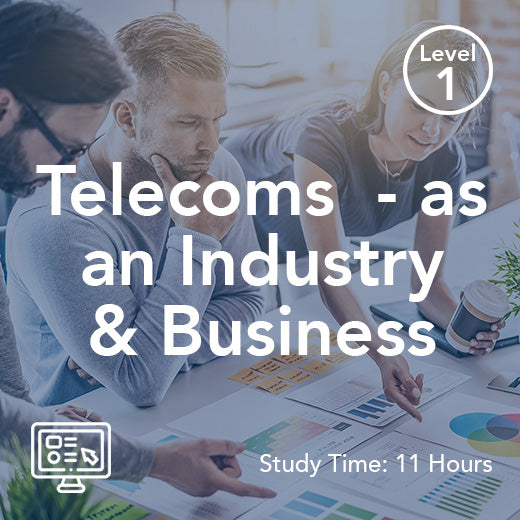
Telecoms – as an Industry and Business (On-Demand)
The Telecoms Industry is based on a range of technologies that are extremely diverse, wide ranging, and highly complex. With this foundation, the industry is able to support a wide variety of service propositions in a significant number of identifiable sectors, and as a result, a vast array of business models. The complex business ecosystems are comprised of many thousands of companies and the relationships that exist between them. This includes Communications Service Providers (CSP), Network Equipment and Handset Vendors, Service / Support Companies, Standardisation Bodies, Regulators, and Content / Media Companies. The ecosystems are dynamic in nature and evolving rapidly in terms of focus. The sheer scale of it all makes it difficult to fully understand and analyse, but in this course, we start that process. We explore the overall make-up of the industry and the business dynamics; the types of organisations involved and their roles and relationships; the service propositions; and main customer segments. We also briefly consider company strategy and business models. An evaluation of the key technologies that support the industry is made, including projections, time-lines and overall market trajectories. Topic Areas Include: Telecoms Industry and Business Dynamics The Technology Explained and Evaluated Telecoms Industry and Market Update
£500.00
-

The Critical Communications & Infrastructure Programme (Railway Sector)
Duration: 24 Months Modern Rail networks rely on efficient and resilient communications networks, without which rail networks cannot operate safely. The demand for up-to-date technical skills for those involved in maintaining and developing transport communications systems continues to grow. The Critical Communications and Infrastructure Programme (Railway Sector) is a comprehensive programme designed to equip professionals in the rail industry with the essential knowledge and skills to excel in their roles. The programme aims to provide participants with a holistic understanding of rail radio communication technologies, strategic insights, and practical skills to navigate the complexities of the ecosystem. This programme has been assured by City & Guilds. Assured status provides validation and recognition for the learner. It is a symbol of learning excellence and quality and is a reassurance that the training undertaken meets best practice standards. Each complete self-paced on-demand distance learning course includes an extensive blend of core reading materials, video resources, quizzes and a dedicated Instructor. All in a modern, intuitive and secure cross-device Virtual Learning Environment. Programme Format Foundation Courses Introduction to Telecoms 2G to 5G Mobile Technologies Radio Principles Specialist Courses: GSM-R Engineering Overview ERTMS/ETCS for Radio Engineers FRMCS Engineering Who would benefit? The Critical Communications and Infrastructure Programme (Railway Sector) would benefit those working in the rail industry with a responsibility for planning, building, maintaining and optimising the rail communications networks of today and tomorrow. Rigorous testing, regular digital badging and certification ensures that successful students are able to demonstrate the breadth and depth of their knowledge. What sets the programmes apart? Focused Learning Pathways – guide you through the material and enable you to become an expert in your chosen field. Flexible Learning – study at a time, location and pace of your choice, allowing you to fit your study into your schedule. Full Tutor Support – from industry experts with decades of experience throughout your studies. 24 months access –access to the all the training materials for 2 years, allowing you to refer back to the material after your studies. Regular Testing and Digital Badges – allow you to demonstrate the depth of your knowledge End of Programme Certificate – students successfully completing the programme are issued with a certificate complete with a grade transcript. Developed and Certified by Wray Castle – the leading supplier of training the global telecoms industry. For purchase of multiple seats, please contact us at uicacaedmy@wraycastle.com
£4,085.00
-

TowerCo Master Service Agreements (MSA) (On-Demand)
A concise course on interpreting TowerCo Master Services Agreements, focusing on telecommunications industry contracts. While this course is not a substitute for legal advice, it will empower you to understand and navigate these complex agreements, covering topics from the importance of contracts to verifying agreement accuracy, contract validity, proactive contract management, and an in-depth exploration of typical contract sections. By the end of this course, you'll be equipped to make informed decisions and safeguard your organisation's interests. Course Contents: Contractual fundamentals Jargon buster approach Cellsite outsourcing in context Importance of proactive contract management to avoid costly disputes Generic form of a TowerCo Master Services Agreement Authority Matrixes
£250.00
-

Web APIs (On-Demand)
This course provides a comprehensive and accessible overview of Web APIs - essential tools for enabling communication between modern software systems. It starts with the basics, defining what APIs are and unpacking the components of an API call, before exploring architectural styles including REST, SOAP, GraphQL, and gRPC. You’ll trace the evolution of APIs and gain insight into key protocols such as HTTP/1.1, HTTP/2, and HTTP/3, as well as common data formats like JSON, XML, and YAML. The course also covers important API standards and specifications such as OpenAPI and AsyncAPI, introduces widely used tools like Swagger and Postman, and outlines core security mechanisms including API Keys, OAuth 2.0, JWT, and OIDC. With structured reading content, visual explanations via short videos, quizzes, FAQs, and a final assessment, this course equips you with the foundational knowledge needed to understand and work with Web APIs in real-world applications. Course Contents Introduction to API Web API Core Protocols API Standards and Specifications API Tools API Security
£95.00
-
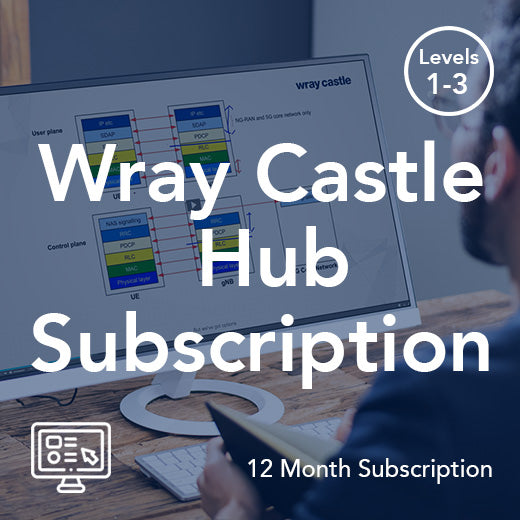
Wray Castle Hub (12 Month Subscription)
Annual Telecoms Training Subscription Package with Unlimited access to 500+ hours of key training material Empower your professional development by building your knowledge of key technology and business topics within the telecoms industry. Unlimited access to future new courses that will cover the latest technology developments as they are added to Hub throughout your 12-month subscription period. Endlessly flexible and applicable to any role within the telecoms industry a subscription to Wray Castle Hub is your ultimate learning resource. You can choose to follow one of our suggested learning pathways, build your own or dip into the learning material module by module. The Wray Castle Hub is also available as an 6-Month Subscription for £945. Learn more here.
£1,400.00
-

Wray Castle Hub (6 Month Subscription)
6-Month Telecoms Training Subscription Package with Unlimited access to 500+ hours of key training material Empower your professional development by building your knowledge of key technology and business topics within the telecoms industry. Unlimited access to future new courses that will cover the latest technology developments as they are added to Hub throughout your 12-month subscription period. Endlessly flexible and applicable to any role within the telecoms industry a subscription to Wray Castle Hub is your ultimate learning resource. You can choose to follow one of our suggested learning pathways, build your own or dip into the learning material module by module. The Wray Castle Hub is also available as an Annual Subscription for £1,400. Learn more here.
£945.00
-

Wray Castle Learning Account
Upskill your workforce with flexible, scalable training solutions The Wray Castle Learning Account offers a flexible, scalable training solution for organizations, enabling upfront budgeting, tailored programs, and comprehensive reporting. Key Features Customised Programmes - Work directly with us to build training programmes tailored to your organization's needs, ensuring budget safety and scalable delivery. Wide Course Variety - Access live sessions, live virtual training, e-learning modules, private team workshops, and expert consultancy services. Upfront Planning - Allocate funds in advance, plan training strategically, align with organizational goals, and gain comprehensive reporting on spend and consumption. Programme Benefits Budget Control & Safety - Maintain complete oversight of training expenditure with upfront allocation. Strategic Alignment - Plan training initiatives with competency assessment options to meet organizational goals. Additional Resources - Access webinars, primers, and supplementary learning materials. Visibility & Reporting - Comprehensive tracking and reporting on training consumption and ROI. Broad Topic Coverage - Wide range of subject areas to address diverse training needs. Simplified Invoicing - VAT invoicing and payment via Purchase Order for streamlined procurement. The Wray Castle Learning Account is ideal for: Organizations seeking to centralize training and budgets. Teams with predictable training spend looking for simplified invoicing and reporting. Organizations requiring scalable training solutions for growing teams L&D and Training Managers who need to demonstrate clear ROI. Ready to transform your training contact us today?
POA: Private Course
























































